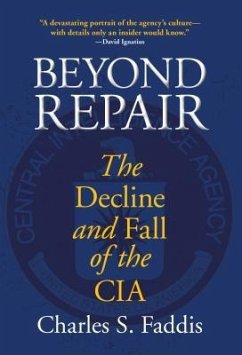Once upon a time, the CIA took the risks necessary to protect America. "If you fall," went its mantra, "fall forward." In Beyond Repair, one of the agency's most respected former operatives mounts a scathing critique of the preparedness of today's CIA-and, specifically, the Directorate of Operations at its core-to defend America against the dizzying dangers of the twenty-first century. In a compelling blend of analysis and fascinating true-life stories, Charles S. Faddis argues that the CIA has devolved into a low-risk or, often, no-risk bureaucracy of careerists whose mantra might be summed up thus: "Don't fall." "Every senior officer I know in the CIA carries personal liability insurance," writes Faddis, "because of the fear of being sued for actions taken in the line of duty." And, he notes, no operatives who commanded CIA teams in Afghanistan have been promoted to key positions. Why? Because they operate within a system that is no longer built to encourage and reward the risk taking and creativity they excelled at. Faddis discusses the birth of the CIA-then called the Office of Strategic Services-during World War II under "Wild Bill" Donovan, the twentieth-century American father of spy craft. Donovan's daring would not get him far in today's CIA, Faddis observes. Describing how the twenty-first-century CIA works from the inside out, he paints an unsettling picture of an agency that has truly gone awry-recalling, for example, his own experience in a Middle Eastern country as a chief of station without a qualified Arabic linguist on hand. Faddis concludes by setting forth the main points of a plan for building a new entity. He proposes that this agency draw on the best qualities of the OSS (and readopt its name) while adapting to twenty-first-century needs, and that it be staffed by many of the CIA's finest men and women. This new agency would maintain the midnight watch, so Americans can sleep well at night.








